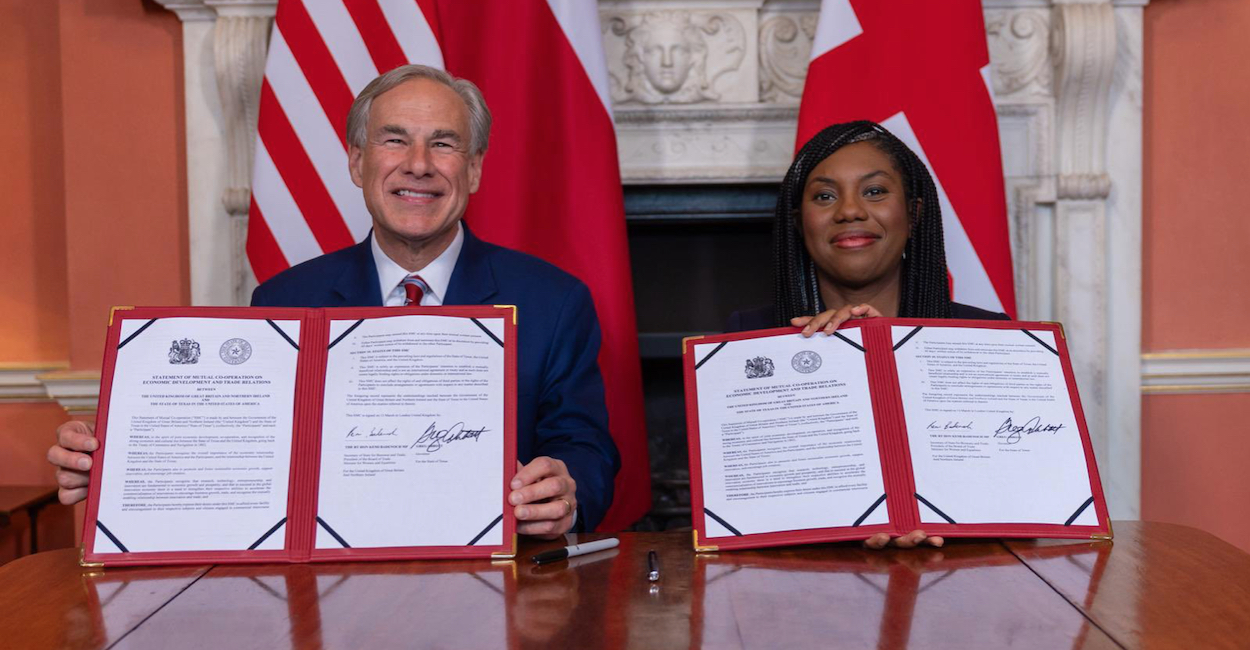By Gully Foyle – 2 minute read
THERE ARE several words and phrases in today’s common UK parlance, the lexicon of the high street and the local pub if you like, that have only recently been introduced through the Brexit era. I doubt many would have known in 2010 what the acronym FTA referred to, let alone some of the detail around how they are agreed. One of these newly introduced phrases is the term “Trade Deal”.
You only need look at the rage induced when non-FTA agreements are signed between the UK and other parties – such as the MoU (Memorandum of Understanding) between the UK and Texas just this week – to see how the term “Trade Deal” has in only a few short years taken on a pseudo-idiomatic mantle with the pro-EU commentariat.
Much in the same way that a girlfriend is not just a friend who happens to be a girl, the term “Trade Deal” now has – rightly or wrongly – a specific meaning in the common UK parlance. For something to be a trade deal, it needs to be a WTO-compliant Free Trade Agreement or Regional Trade Agreement – by which I mean an agreement that meets the WTO definition of such, which is one which substantially removes tariffs between the signatories to the deal.
So it is quite right to say, within this definition of the term trade deal, that the agreement signed between the UK and the US state of Texas is not a trade deal – and woe betide anyone with a social media presence who describes it incorrectly.
Much like any political discourse though in the social media age, words are used as weapons – and their definitions conveniently ignored or augmented to suit a particular narrative. In this case, an additional definition has been assigned – that only trade deals have any value, any worth.
Take even a casual stroll through X/Twitter, and you will see those all too quick to dismiss the potential value-add of the UK-Texas MoU, purely on the basis that it is “not a trade deal”. A simple truth needs to be laid out here: no agreement between two parties – be it an MoU, an FTA, or even dare I say it a Single Market – will add an iota of value to an economy if the businesses within that economy do not use it, do not take advantage of the improved trading environment.
Trade deals do not create trade. Businesses create trade.
All that governments can do, is try to create a more welcoming environment for the trade to operate in – a petri dish with nutrients in it, for the cells to multiply within.
Having a better relationship with one of the biggest and most entrepreneurial states, of by far the biggest economy in the world, is a good thing. If signing an agreement creates opportunity or prosperity for our nation, be it just an MoU of good intentions or otherwise, then it should be celebrated.
There are those who are too quick and too eager to speak ill of any and all attempts the current UK government makes, to create a better post-Brexit environment for UK businesses to prosper. Perhaps our time would be better spent looking into how we can best take advantage of these new opportunities, instead of trying to pull them down.
If you appreciated this article please share and follow us on Twitter here – and like and comment on facebook here. Help support Global Britain publishing these articles by making a donation here.
Gully Foyle is a passionate researcher and commentator on post-Brexit trade between the UK and the rest of the world. You can find out more on his X (formerly Twitter) profile at https://twitter.com/TerraorBust

